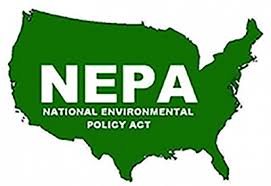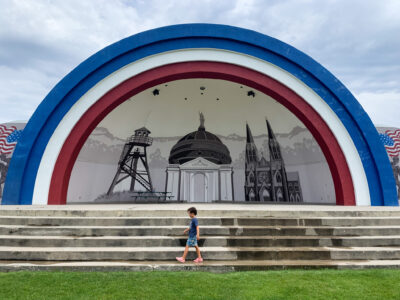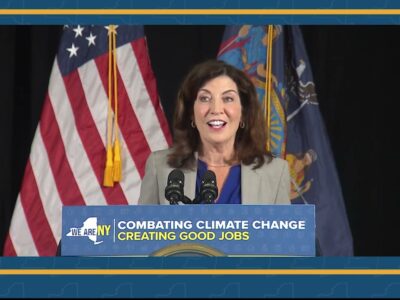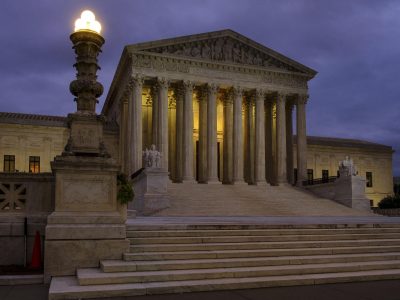Environmental Justice
CEQ and Permitting Reform
The enactment of NEPA 2.0 presents a golden opportunity for the agency.
In the recent debt ceiling law, Congress extensively revamped NEPA, the law governing environmental impact statements. An obscure White House agency, the Council on Environmental Quality (CEQ), will have the first opportunity to shape the interpretation of the new language. Much of the language in the new law is poorly drafted or vague, making CEQ’s …
Continue reading “CEQ and Permitting Reform”
CONTINUE READINGA Climate Trial in Montana Sets the Scene for More
Held v. Montana is the first of many climate lawsuits by youth plaintiffs to go to trial. Big Sky Country is a fitting forum for this phase of climate change litigation.
Young people who have the most to lose from climate change have filed lawsuits in all 50 states, but the first of these cases to go to trial will be in Montana—unofficially nicknamed “the Last Best Place”—which may be the perfect venue for a landmark trial about government culpability for the global climate crisis. Starting …
Continue reading “A Climate Trial in Montana Sets the Scene for More”
CONTINUE READINGLocal Authority Over Oil Drilling Heads to California Supreme Court
Cities and counties have long held authority to decide where and whether to allow oil and gas exploration and extraction. The state’s high court can make that crystal clear.
If California residents decide by voter initiative to limit land uses for oil and gas extraction in their county, can fossil fuel businesses turn around and claim state preemption to overturn the voice of the voters? That’s what is at issue in a case that’s headed to the State Supreme Court. Oral arguments in this …
Continue reading “Local Authority Over Oil Drilling Heads to California Supreme Court”
CONTINUE READINGNew York’s New Environmental Justice Law
Unless amended or carefully implemented, there’s a risk the law could hurt the communities it’s meant to serve.
New York has enacted what may be the country’s most stringent environmental justice law. The state deserves credit for its commitment to remedying the unfair pollution burdens placed on disadvantaged communities. The law is so broadly worded, however, that it may have the potential to prevent economic development that would aid those communities, or even …
Continue reading “New York’s New Environmental Justice Law”
CONTINUE READINGAir Quality Watchdog Agrees to Get Tougher on Refineries
There’s a favorable settlement in the case brought by Earthjustice on behalf of EYCEJ with help from UCLA law students.
Last year, the South Coast Air Quality Management District was accused of not properly enforcing a state law that requires petroleum refineries to install air-quality monitoring systems around their perimeter. Essentially, the air quality watchdog exempted smaller refineries from having to follow the rules. Now, the SCAQMD has agreed to reverse course and move to …
Continue reading “Air Quality Watchdog Agrees to Get Tougher on Refineries”
CONTINUE READINGNew York Adopts Cap and Trade
Yes, the new NY law includes some bans on natural gas. That’s far from all it does.
Last week, New York Gov. Kathy Hochul signed major climate legislation. Press coverage focused on one small piece of the legislation: a partial ban on natural gas use in new buildings. That’s controversial and easily grasped by the public. But a much bigger part of the new law went almost unnoticed: the legislature’s endorsement of …
Continue reading “New York Adopts Cap and Trade”
CONTINUE READINGWhen Is It Legal to Consider Race in Regulating?
Two upcoming Supreme Court decisions will tell us a lot about the answer.
On Halloween, the Supreme Court heard oral argument in cases brought by Students for Fair Admissions (SFFA) against Harvard and UNC. These cases seem likely to move the Court closer to requiring colorblindness. How would that impact EPA’s ability to pursue environmental justice? Based on comments of the Justices during the arguments in the Harvard …
Continue reading “When Is It Legal to Consider Race in Regulating?”
CONTINUE READINGA New Battleground in Big Oil’s War on Drilling Setbacks
Big Oil’s referendum on setbacks is the latest in a line of questionable signature-gathering campaigns. Would a new bill reform California’s referendum process?
Earlier this month, my colleague Beth Kent wrote a thorough overview of the referendum seeking to reverse SB 1137, a bill passed by the California Legislature establishing a 3,200-foot setback between new oil and gas wells and sensitive receptors, including homes, schools, and hospitals. That referendum (Ballot Measure 22-0006) will appear on the November 2024 …
Continue reading “A New Battleground in Big Oil’s War on Drilling Setbacks”
CONTINUE READINGHow Should We Implement the New Federal Climate Laws?
An upcoming symposium by the Emmett Institute will explore the key climate impacts of IIJA and the IRA and unpack some of the obstacles and controversies around their implementation.
This is the first of a series of posts previewing the Emmett Institute’s 2023 Symposium, coming up on April 12. Check out the second post, on transmission infrastructure, and the third post, on transportation; and RSVP for the Symposium here! The Infrastructure Investment and Jobs Act of 2021 (IIJA) and the Inflation Reduction Act of …
Continue reading “How Should We Implement the New Federal Climate Laws?”
CONTINUE READINGCritical Native American Water Rights Cases Come Before the Supreme Court: Arizona v. Navajo Nation
The Navajo Nation Has the Equities on Its Side, But the U.S. Department of the Interior May Well Have the Law in Its Favor
Today the U.S. Supreme Court hears oral arguments in the last natural resources cases on its docket this Term: Arizona v. Navajo Nation and U.S. Department of the Interior v. Navajo Nation. These consolidated cases are consequential for several reasons: to determine the scope of the federal government’s trust obligations to Native American tribes; to …
CONTINUE READING













